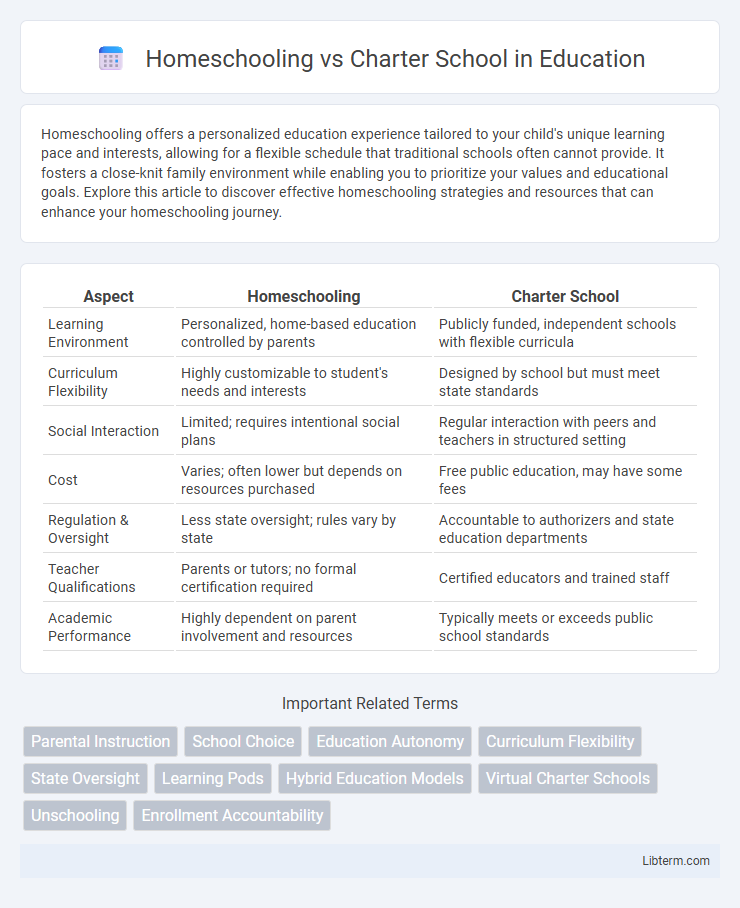Homeschooling offers a personalized education experience tailored to your child's unique learning pace and interests, allowing for a flexible schedule that traditional schools often cannot provide. It fosters a close-knit family environment while enabling you to prioritize your values and educational goals. Explore this article to discover effective homeschooling strategies and resources that can enhance your homeschooling journey.
Table of Comparison
| Aspect | Homeschooling | Charter School |
|---|---|---|
| Learning Environment | Personalized, home-based education controlled by parents | Publicly funded, independent schools with flexible curricula |
| Curriculum Flexibility | Highly customizable to student's needs and interests | Designed by school but must meet state standards |
| Social Interaction | Limited; requires intentional social plans | Regular interaction with peers and teachers in structured setting |
| Cost | Varies; often lower but depends on resources purchased | Free public education, may have some fees |
| Regulation & Oversight | Less state oversight; rules vary by state | Accountable to authorizers and state education departments |
| Teacher Qualifications | Parents or tutors; no formal certification required | Certified educators and trained staff |
| Academic Performance | Highly dependent on parent involvement and resources | Typically meets or exceeds public school standards |
Introduction to Homeschooling and Charter Schools
Homeschooling allows parents to customize their child's education by delivering curriculum at home, offering flexibility in teaching styles and schedules tailored to individual learning needs. Charter schools are publicly funded independent schools operating under a charter with increased autonomy in curriculum and management while adhering to state education standards. Both options provide alternatives to traditional public schooling, with homeschooling emphasizing personalized instruction and charter schools offering specialized academic programs within a public school framework.
Key Differences Between Homeschooling and Charter Schools
Homeschooling offers personalized education tailored to a child's learning pace and style, often managed directly by parents, allowing for flexible scheduling and curriculum choices. Charter schools operate within the public school system with state funding but provide alternative teaching methods, specialized programs, and greater autonomy compared to traditional public schools. Unlike homeschooling, charter schools require enrollment, follow state standards, and offer social interaction opportunities through organized extracurricular activities.
Curriculum Flexibility and Educational Approaches
Homeschooling offers unparalleled curriculum flexibility, allowing parents to tailor lessons to their child's learning style and pace, often integrating diverse educational approaches such as Montessori or classical education. Charter schools provide a structured environment with innovative teaching methods and specialized programs but must adhere to state standards and testing requirements, limiting curricular customization. The choice between homeschooling and charter schools hinges on the degree of autonomy desired in educational content and instructional strategies.
Socialization Opportunities for Students
Homeschooling offers personalized socialization through family interactions, community groups, and extracurricular activities, fostering tailored social development but with limited peer diversity. Charter schools provide structured socialization within diverse student populations, promoting collaborative learning and group participation essential for social skills. Both environments impact socialization differently, emphasizing the need to consider individual student needs and social goals.
Parental Involvement and Responsibilities
Parental involvement in homeschooling requires direct responsibility for curriculum design, daily instruction, and progress assessment, ensuring personalized education tailored to the child's needs. Charter schools involve parents primarily through volunteering and participation in school governance, while certified teachers manage curriculum delivery and accountability. The level of parental commitment in homeschooling is significantly higher, demanding extensive time and educational resources compared to the collaborative, school-led environment of charter schools.
Academic Performance and Outcomes
Homeschooling often provides a personalized curriculum tailored to a student's unique learning pace, resulting in above-average standardized test scores and higher college admission rates compared to traditional public schools. Charter schools, while offering specialized programs and innovative teaching methods, demonstrate varied academic outcomes influenced by factors like location, funding, and governance. Research shows that both educational models can outperform traditional public schooling in student achievement, but success heavily depends on parental involvement in homeschooling and school quality in charter education.
Legal Requirements and Regulations
Homeschooling requires parents to comply with state-specific legal mandates, which often include submitting a notice of intent, maintaining attendance records, and providing instruction in core subjects, while regulations vary widely by state. Charter schools operate under state laws that demand adherence to a charter contract outlining academic standards, accountability measures, and periodic performance reviews governed by a charter authorizer. Both educational options involve oversight mechanisms to ensure compliance, but charter schools face stricter external evaluations compared to the self-regulatory nature of homeschooling.
Cost and Accessibility Considerations
Homeschooling offers flexible cost options, primarily involving expenses for curriculum materials and extracurricular activities, making it potentially more affordable for families in varied income brackets. Charter schools provide tuition-free education funded by public resources but may incur additional costs such as transportation and school supplies, with accessibility influenced by geographic location and enrollment lotteries. Both education models require families to weigh financial commitments against convenience and availability to determine the best fit for their child's learning needs.
Extracurricular Activities and Enrichment Options
Homeschooling offers personalized extracurricular activities tailored to a child's specific interests, often involving community groups, online classes, and specialized clubs, while charter schools provide structured enrichment programs including sports teams, music ensembles, and academic clubs within a collaborative school environment. Access to diverse resources in charter schools supports social interaction and skill development, whereas homeschooling requires proactive planning to ensure comparable variety and social engagement. Both options present unique advantages in fostering growth beyond core academics through extracurricular involvement and enrichment opportunities.
Choosing the Right Educational Path for Your Child
Selecting the right educational path involves evaluating homeschooling and charter school options based on your child's learning style, academic needs, and social development. Homeschooling offers personalized curriculum customization and flexible scheduling, fostering individualized attention and family involvement. Charter schools provide structured environments with specialized programs, enhanced extracurricular activities, and access to certified teachers, supporting diverse learning preferences and social interaction opportunities.
Homeschooling Infographic

 libterm.com
libterm.com